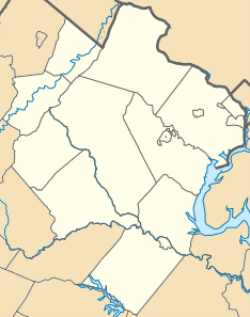Dranesville Tavern | |
 | |
| Location | 11919 Leesburg Pike, in or near Herndon, Virginia [1] |
|---|---|
| Coordinates | 39°0′28″N77°21′38″W / 39.00778°N 77.36056°W |
| Area | 5 acres (2.0 ha) |
| Built | 1850 |
| Built by | Cockerille, Sanford |
| Architectural style | Greek Revival, Vernacular Greek Revival |
| NRHP reference No. | 72001393 [2] |
| VLR No. | 029-0011 |
| Significant dates | |
| Added to NRHP | November 9, 1972 |
| Designated VLR | April 18, 1972 [3] |
The Dranesville Tavern that was located in Dranesville, Virginia dates from 1823. [4] It was listed on the National Register of Historic Places in 1972. [2] The building has been moved from its original location and is now located near Herndon. [1]

The tavern was built in 1823 by Stanford Cockerille at the intersection of Georgetown Pike and Alexandria Leesburg Pike. [4] [5] It was a "wagon stand" type of tavern, catering to teamsters. [6] It remained open to the public until 1946, and to boarders until 1968. [4]
The proposed widening of Route 7 in the mid-1960s threatened the Dranesville Tavern. [7] In 1968, the building was moved 130 feet from its original location to preserve it. [8] In July 2025, the Fairfax County Park Authority announced a "Resident Curator Program" which allows residents to live in the tavern for free in exchange for the rehabilitation and long-term maintenance of the property. [5] [4]




